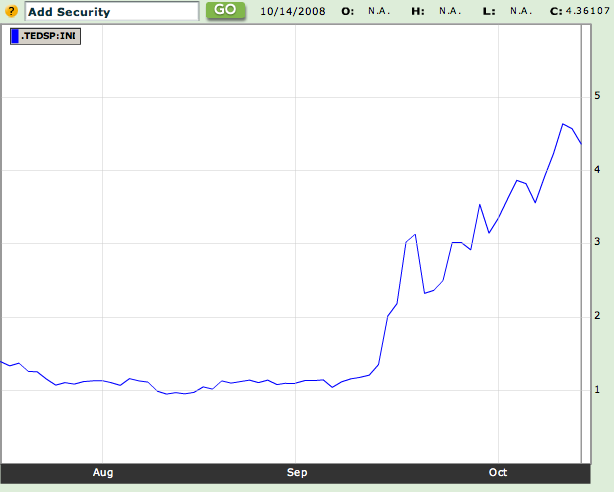Nouriel Roubini, an economist at New York University who predicted the current financial crisis as the housing bubble collapsed, was sometimes called "
Dr. Doom" because of his pessimistic forecasts for the economy. Although he believes current efforts to salvage the banking system are "going in the right direction," they are too late to keep the world from sliding into the
worst recession in 40 years. "We're going to be surprised by the severity of the recession and the severity of the financial losses," he told Bloomberg Television:
The economist said the recession will last 18 to 24 months, pushing unemployment to 9 percent, and already depressed home prices will fall another 15 percent.
But that's nothing compared to sociologist
Immanuel Wallerstein's prognosis of a world-wide depression followed by a 20-50-year period of turmoil until a new order emerges to
replace the capitalist world-system that has dominated the globe for 500 years:
We can assert with confidence that the present system cannot survive. What we cannot predict is which new order will be chosen to replace it, because it will be the result of an infinity of individual pressures. But sooner or later, a new system will be installed. This will not be a capitalist system but it may be far worse (even more polarizing and hierarchical) or much better (relatively democratic and relatively egalitarian) than such a system. The choice of a new system is the major worldwide political struggle of our times.
...
We are moving into populist government-led redistribution, which can take left-of-center social-democratic forms or far right authoritarian forms. And we are moving into acute social conflict within states, as everyone competes over the smaller pie. In the short-run, it is not, by and large, a pretty picture.
Wallerstein is the doyen of
World-systems theory, which analyzes history in terms of large-scale economic cycles. In his view, the capitalist system has been winding down since the late 1960s, has the US has declined as a hegemonic power, and as capitalist enterprises have gradually maxed out possibilities for increased profits in production.
I don't pretend to be a far-sighted theorist, but it does seem virtually certain that we're entering some new phase of world history. The free-market-über-alles ideology that has gained power for the last three decades or so is now on the decline. I'm perhaps more optimistic that Wallerstein seems to be about what comes next, though I do worry that depletion of natural resources (like oil and water) could make the next century pretty brutal. It does seem, though, that recently our politics are moving in the right direction. In any case, the next fifty years should be pretty interesting.
 The graphs show support for Republicans compared to the national average by occupational group for the last 50 years. An upward slope means increasing support for Republicans. Business owners and skilled workers show the largest increases in Republicanism, with non-skilled workers not far behind (though they are still slightly more Democratic than the national average).
The graphs show support for Republicans compared to the national average by occupational group for the last 50 years. An upward slope means increasing support for Republicans. Business owners and skilled workers show the largest increases in Republicanism, with non-skilled workers not far behind (though they are still slightly more Democratic than the national average).

